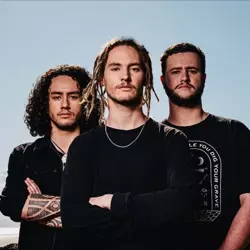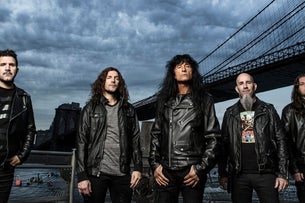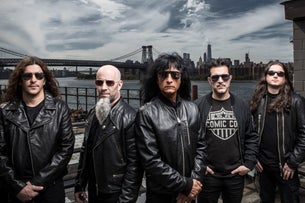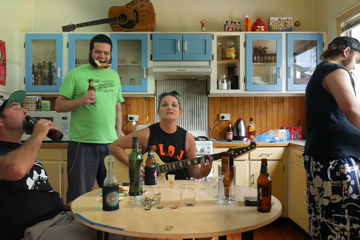 Alien Weaponry
Alien WeaponryAs Mick Wall and Joel McIver would say on their Dead Rock Stars podcast, young New Zealand groove-thrash metal trio Alien Weaponry have "exploded onto the scene" during recent times. The release of debut album Tū in 2018 raised the teens' stock even further – it dominated the charts in their homeland, won rave reviews overseas and its touring cycle achieved some lofty goals.
One such aspiration they made happen last year was to perform at Germany's Wacken Open Air festival before drummer Henry de Jong turned 20 – he will celebrate his 19th birthday between stops on the Download Festival run. “We set that a few years back, and pretty much that's what we decided,” the tub-thumper says. “We didn't really think it would happen, but yeah, it worked out, and we're stoked about it,” he laughs.
"We just decided that we wanted to be in a band, actually write music, make an album and try and do things that I guess weren't really normal for kids our age.”
“I think we were all taking the band quite seriously from the get-go. We were pretty little in 2010; Lewis [de Jong's younger brother – guitars/vocals] was eight and I was ten. We just decided that we wanted to be in a band, actually write music, make an album and try and do things that I guess weren't really normal for kids our age,” he chuckles. “It just ended up working out.”
Don't miss a beat with our FREE daily newsletter
The band's touring experience both at home and abroad belies their youth. Were they essentially forced to grow up rather quickly in that road environment? “We've been doing the touring scene, especially over in New Zealand for a few years, so we got kind of used to it over here. But it's really different when you go overseas and there's so many things that are really different about the touring over there. Especially the long drives in between; that's definitely something we've still got to get used to. It's a really cool experience though, and we're super stoked to be doing it.”
They've encountered some heroes along the way, too, who perhaps felt compelled to pass on wisdom to the thrash upstarts. For instance, the drummer says when they toured the US with Ministry, frontman Al Jourgensen imparted valuable knowledge. “He's pretty crazy, but he's really cool and he's got a lot of really good advice,” de Jong remarks.
“One of the first guys to really support us and help us with our music stuff was Paul Martin from Devilskin. He's been a huge supporter of us since we started, and he's been really helpful over the years. Just with getting us exposure, as well as allowing us to get into the touring scene here in New Zealand, not just pub shows.”
As well as realising their dreams of travelling the world playing metal, the youthful three-piece have also utilised their platform to convey a key message. Channeling Brazilian metal gods Sepultura's embracing of their culture, the New Zealand outfit celebrate their indigenous heritage, to the extent that the band often sings in te reo Māori.
“It's funny, because a lot of people say they can hear the [Sepultura] influence in the music. But it's interesting, because when we started writing in Māori, we actually hadn't really listened to Sepultura much at all. I'd heard Roots maybe twice, and it wasn't really something that we thought of when we started writing in Māori. It was only after the fact that people started comparing us to them. And we were like, 'Oh shit, I guess we are kind of doing the same thing.'”
Alien Weaponry have even won cultural awards back home. “We want people to be inspired to learn more. If they're in New Zealand, learn more about Māori culture and New Zealand history, as well as people in other countries to just learn more about the past of their country, and where they come from if they've got native history in their family. And just be more aware of that stuff. Because we feel, especially in New Zealand, a lot of people are quite oblivious to things that have happened here not too long ago.”
"We want people to be inspired to learn more."
The group has incorporated the haka into their approach, and fans often break into the traditional war dance at shows. That said, The Music posits that there must be occasions where the band performs overseas and perhaps the cultural elements elude some punters who solely want to down beers and headbang. “It definitely depends on the person, but we get a lot of people that really get into the whole cultural, historical aspect of what we do. And that's really cool for us to see all these people really just getting into it, and saying they've started learning Māori or started learning their own native language because they love what we're doing with the band. Which is really inspiring for us.”

















